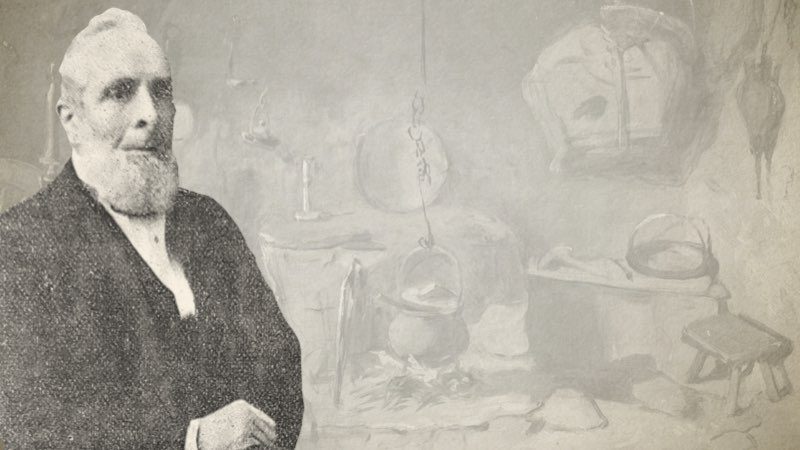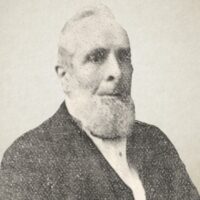
The Life And Ministry Of James Frederick Applegate
Earthen Vessel 1898:
The Late Mr. James Frederick Applegate
By Ebenezer Marsh, of Stratford
“And enoch walked with God; and he was not; for God took him.”—Gen 5:24
James Frederick Applegate, whose portrait we have just looked upon is no more. Truly, “he walked with God,” and now he is for ever with his Lord at home…Our dear brother was born at Westbury, near Trowbridge, on January 29th, 1822, of godly parents. He was one of eight children, and it was the joy of his heart to know that his six dear sisters and only brother were numbered with the redeemed of the Lord, and “followers of them who through faith and patience inherit the promises.”
Lovers of truth, those godly parents, like Abraham and Sarah, commanded “their children, and household after them,” and our dear brother, with the rest, was taken from infancy to the house of God to hear that faithful preacher of the Gospel, John Warburton. Many a Lord’s-day morning the little lad toddled along at his father’s side to the place which, in after years, was to be so sacred to him as the spot where “His best friends and kindred dwelt; Where God his Saviour reigned,” although not the sphere of his own active service in the cause of Christ.
Of his call by grace but little is known; but that he was so called, evidence is abundant in his life history. He could tell of what mighty change grace works within, of the sorrow for sin, and godly repentance unto life; of the preciousness of that Saviour whom grace gave him to claim as his own, and of the joys of salvation by which his wounded heart became healed, and his soul fired in the service of his Lord, whom he publicly confessed in believer’s baptism on Christmas Day, 1847, the late Mr. McKenzie baptizing him at Liverpool. He was married at the age of twenty years, but after only twelve months of happy fellowship his godly companion was taken from him, leaving him, with one child, to mourn her loss.
Toward the close of the year 1848, or beginning of 1849, our brother came to London, and after six years of lonely travelling, the Lord found for him a true helpmeet in the person of Charlotte Bowers, who was at that time a member of the Church at Soho, being baptized by the late beloved George Coombe. Their marriage took place at Stepney on September 15th, 1843. For thirty-three years they walked together in the fear of the Lord, and on April 20th, 1882, the gracious Giver claimed His own possession, and called His loved one home to her eternal rest. This was a heavy stroke to our dear brother, but many of the readers of this magazine, and especially those of the Aged Pilgrims’ Friend Society, know what a true comforter was his only daughter, who now became his housekeeper, while his godly sons (for God has indeed blessed the seed of the righteous) loved and cared well for the bereaved father.
On coming to London our brother made his home at “Zoar,” Great Alie-street, for several years. It was, however, at Artillery-street he was chosen of God to active service as a worthy deacon and secretary of the Church. It was in the year 1861 he cast in his lot with the Lord’s people here, and it was truly his home until the pastor (Mr. Blake) gave notice that “The old-fashioned style of preaching emptied the pews,” and that in future he should “preach the Gospel in a new dress.” Thank God our brother was one of those who neither wanted a new cart for the old ark, or a new dress for the old Gospel. The glorious Gospel of the blessed God was his meat and drink indeed, and the doctrines of free and sovereign grace to him needed nothing added to or taken from. The new dress drove him from his loved home, and for some time he was out of the fellowship of the Church, attending principally the ministry of the late Mr, Franks, at Bloomsbury Chapel. In the year 1883 his beloved daughter-in- law, Mrs. F. Applegate, told him that her pastor, the late J. Hazelton, once said, “The Lord, like a gardener, never puts his choice plants in the road, or pathway, but plants them in the garden.” Unsettled, and unhappy in his mind, hankering after his old home, now that Mr. Blake was removed, these words came to his soul as a message from God, and he decided to re-enter the Church at Artillery- street. He did so, and was shortly afterwards called to the office of deacon, and filled his office “well” until his Lord called him home. When this Church became united with the friends worshipping at Commercial-street none took more interest in it than our dear brother. Many and earnest were his prayers that the truth he loved might long be maintained and blessed of God within those walls.
His work, however, was drawing to a close, and for some few months past his friends noticed he failed in strength, while it was often remarked at the prayer-meetings, “that his prayers seemed nearly all praises, and they feared they would not have him much longer with them,” None, however, thought how near it was. In his Father’s house on earth one Lord’s-day-the next he spends with his Lord at home,
On Tuesday, November 9th, the writer was preaching at Commercial-street in the afternoon, and our brother was there. The Word was much blessed to him, and he seemed very full as he chatted with us at the tea-table. Towards the close of the evening service he was taken unwell, and had to be conveyed home in a cab. The doctor was called in the next morning, who said he must be kept very quiet, and have no visitors. Nothing serious was anticipated until between five and six o’clock on Friday, when there was an evident change. A letter was read to him from Mr. Hazelton which he much enjoyed, remarking, at the close, “Ah! the dear fellow, he was always so kind to me.” About four o’clock he said, “If the Lord should raise me up again I shall be obliged to resign my office of deacon.” At six o’clock, thinking it was later, he said to his daughter, “If you think all arrangements are made for the night don’t you think you had better get the Book.” She did so, asking him what he would like her to read; to which he replied, “Read the 8th chapter of Romans.” As his dear child read, he would fill in from memory verse by verse, and evidently enjoyed once more the chapter he was wont to call “my own.” Just after the reading his daughter said, “Father, dear, you are very ill.” He said, “I know I am.” His daughter then remarked, “The Lord can do all things,” repeating also the words, “Jesus Christ, the same yesterday, to-day, and for ever.” He smiled sweetly, and said, “Ah! blessed be God, He never changes,” adding, “Whom have I in heaven but Thee? and there is none upon earth that I desire beside Thee.” At eight o’clock his dear pastor (Mr. Othen) came to see him. Taking his hand he said, “There is, therefore, now no condemnation,” the dear saint added the rest of the text, and gradually “fell on sleep,” for, an hour after this he was “Absent from the body, and present with the Lord,” passing away without even, apparently, a sigh.
“Fearless he entered Jordan’s flood;
At peace with heaven he closed his eyes;
His only trust was Jesus’ blood,
In sure and certain hope to rise.”
The Church where he so faithfully laboured have suffered a heavy loss, while every minister of the Gospel who knew him will readily acknowledge they have lost a true and sympathetic brother. Many of God’s servants have sat at his board, and slept under his roof, counting it a privilege to spend a few hours with “dear old friend Applegate.” The mortal remains lay in the family grave at Tower Hamlets Cemetery.
Being dead he yet speaketh, and a few words from himself will be the best close to this already rather lengthy account.
On September 16th, writing to our beloved brother Broome (so long the faithful pastor at Fressingfield, Suffolk), he said, “Blessed be my covenant God and Father, the foundation He has laid in Zion ever abides, and so it will do in opposition to all that hell and sin can do; for, blessed be God, there is a deep that coucheth beneath, which the devil can never fathom. I often feel like the Church of old, when she in surprise exclaimed, ‘Lo, this is our God; we have waited for Him, and He will save us,’ &c. And you, dear brother, know what it is to be overwhelmed at the goodness and mercy of our beloved Lord, when favoured to drink a little at the streams of eternal love and faithfulness. How it makes the heart leap for joy, and, with the Church, to exclaim, ‘Or ever I was aware my soul made me like the chariots of Amminadib.’ What a mercy we have a God in Christ Jesus our Brother; who is ever at hand, and ‘knoweth how to succour in all our perplexities, and has given us so many blessed ‘fear nots’ to cheer us on our homeward journey, and, when the time arises, will come and fetch us home, and so shall we be with our beloved Lord for ever, eternally shut in; no more tempting devil to perplex, nor sin to annoy; and so we will say, with dear old Job, ‘All the days of my appointed time will I wait till my change come.’ Flesh and blood cannot enter the kingdom. What will it be to be there?
“‘My soul anticipates the day,
Would stretch her wings and soar away.”
‘Oh!’ says my dear Lord, ‘come with me from Lebanon,’ and so our soul goes forth by faith in the footsteps of the flock of slaughter, following the dear Lord by the guiding hand of the Holy Ghost in the pathway of regeneration, in hope of eternal life, which God, that cannot lie, promised before the world began.’ Such eternal truths ought to cheer our wary spirits, and banish all darkness, and make us joyful in the house of our God. Well, blessed be God, we get a few peeps by faith, and that cheers us on the road; and when we get over the border, and enter into the land, we shall bid farewell to faith and hope, but love will ever remain.”
The Lord raise up for Zion many such stewards as James Frederick Applegate.
James Applegate (1822-1897) was a Strict and Particular Baptist deacon. He was blessed to sit under the ministry of John Warburton as a boy, and was baptised by John McKenzie after his profession of faith. In 1861, he joined the church meeting at Artillery-street (London), after which he was appointed deacon and secretary. However, the pastor (Mr. Blake) announced he would “preach the gospel in new dress”, for “the old-fashioned style of preaching emptied the pews”. Mr. Applegate, believing sovereign grace was the power of God unto salvation, quit the church. Sometime after, Mr. Blake also left the church, leading Mr. Applegate to rejoin the congregation. He was again appointed as deacon, a position he held until his death. His home was frequently opened to guests and visiting gospel preachers, earning for himself high esteem among the churches as a gracious and hospitable host. Truly did Paul write, “For they that have used the office of a deacon well purchase to themselves a good degree, and great boldness in the faith which is in Christ Jesus.” (1 Tim 3:13)



